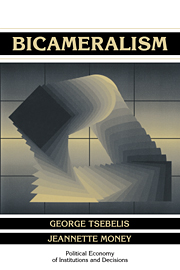Book contents
- Frontmatter
- Contents
- List of tables and figures
- Series editors' preface
- Acknowledgments
- Introduction
- PART I THE HISTORY AND GEOGRAPHY OF BICAMERAL DIVERSITY
- PART II MODELS OF BICAMERAL INSTITUTIONS
- Introduction to Part II
- 3 The core and the uncovered set of bicameral legislatures
- 4 A model of intercameral bargaining
- 5 A model of conference committees and their proposals
- PART III EMPIRICAL STUDIES OF BICAMERALISM AND IMPLICATIONS
- Conclusions
- References
- Index
3 - The core and the uncovered set of bicameral legislatures
Published online by Cambridge University Press: 02 December 2009
- Frontmatter
- Contents
- List of tables and figures
- Series editors' preface
- Acknowledgments
- Introduction
- PART I THE HISTORY AND GEOGRAPHY OF BICAMERAL DIVERSITY
- PART II MODELS OF BICAMERAL INSTITUTIONS
- Introduction to Part II
- 3 The core and the uncovered set of bicameral legislatures
- 4 A model of intercameral bargaining
- 5 A model of conference committees and their proposals
- PART III EMPIRICAL STUDIES OF BICAMERALISM AND IMPLICATIONS
- Conclusions
- References
- Index
Summary
The basic problem with identifying the possible outcomes of a majoritarian decision-making process, such as decisions of unicameral or bicameral legislatures, is the fact that collective preferences, unlike individual ones, are not transitive. This means that although a legislature can prefer outcome a over b, and outcome b over c, by majority rule, it is still possible for the same legislature to prefer outcome c over a. This set of preferences results in unstable decision making; any outcome may be defeated by a majority, and that outcome in turn may be defeated by yet another majority. And the process may be repeated endlessly.
For this reason, the concept of the core became a basic tool in social choice theory and cooperative game theory. The core is the set of points that cannot be defeated by the application of the decision-making rule. So the core of a unicameral institution is the set of points that cannot be defeated by majority or any other decision-making rule; the core of a bicameral legislature is the set of points that cannot be defeated by concurrent majorities in both chambers; and so forth.
For unicameral legislatures, Plott has shown that the necessary and sufficient conditions for the existence of a core are very restrictive (Plott 1967: 790). He demonstrated that in a legislature with an odd number of members, a core exists in an n-dimensional legislative space (n > 1) only when it is located on the ideal point of at least one member and the remaining even number of members are “divided into pairs whose interests are diametrically opposed.”
- Type
- Chapter
- Information
- Bicameralism , pp. 80 - 97Publisher: Cambridge University PressPrint publication year: 1997

